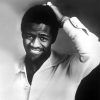calsfoundation@cals.org
Lester Bowie Jr. (1941–1999)
Lester Bowie Jr.—a revered experimental jazz trumpeter, composer, and band leader—lived in Little Rock (Pulaski County) as a child for a short time while his father, Lester Bowie Sr., also a trumpeter, taught at Dunbar High School.
Lester Bowie Jr. was born in Frederick, Maryland, on October 11, 1941, and, according to some obituaries, grew up in Little Rock and St. Louis, Missouri, where, after leaving Dunbar, his father was a high school band director for thirty years. Bowie’s mother was Little Rock native Earxie Lee Willingham Bowie.
Bowie said that he had no memory of when he started to play trumpet, telling one interviewer that his father gave him a trumpet mouthpiece in the crib, and he set the “official” date of his start on the instrument at five because he did not remember a time when he did not play.
In St. Louis, Bowie played in local bands, and, after serving in the U.S. Air Force, he played with jazz and R&B bands in Texas and studied music at Lincoln University in Pennsylvania and North Texas State University, before moving to Chicago in the mid-1960s.
In Chicago, he became affiliated with two seminal groups of jazz musicians. The first was the Association for the Advancement of Creative Musicians (AACM), which was devoted to promoting and recording original music, not just jazz. Later, in 1966, Bowie co-founded, with a sub-set of AACM members, the Art Ensemble of Chicago, an avant-garde jazz group.
Its members were all multi-instrumentalists. Bowie played trumpet, cornet, flugelhorn, conch shells, and the shofar, which is often made of a ram’s horn. The ensemble also integrated non-standard “instruments,” including bicycle horns, party noisemakers, and other devices that made percussive sounds. Members would wear costumes, perform theatrically, and recite poetry. Bowie favored a white lab coat, wore his hair in a flattop, and had a forked goatee. Many photographs of him show him holding either a trumpet or a skinny cigar, sometimes both.
Bowie had a throwback style that used smears, growls, and half-valving on the trumpet in the style of earlier jazz musicians such as Duke Ellington’s trumpeters Cootie Williams and Bubber Miley and the cornetist Rex Stewart. Yet, he played a distinctly modern style of music.
Bowie died of liver cancer on November 8, 1999. He was survived by his wife, Deborah, six children, two brothers, and several grandchildren, as well as his father.
For additional information:
“Category Archives: Lester Bowie.” Today Is the Question: Ted Panken on Music, Politics and the Arts. https://tedpanken.wordpress.com/category/lester-bowie/ (accessed October 20, 2023).
Fordham, John. Obituary of Lester Bowie. Guardian, November 10, 1999. https://www.theguardian.com/news/1999/nov/11/guardianobituaries.johnfordham (accessed October 20, 2023).
“Jazz Trumpeter Lester Bowie, 58.” Washington Post, November 12, 1999. https://www.washingtonpost.com/archive/local/1999/11/12/jazz-trumpeter-lester-bowie-58/d6f589a7-e0af-4d29-bc98-2946f460e664/ (accessed October 20, 2023).
Ratliff, Ben. “Lester Bowie is Dead at 58; Innovative Jazz Trumpeter.” New York Times, November 11, 1999. https://www.nytimes.com/1999/11/11/arts/lester-bowie-is-dead-at-58-innovative-jazz-trumpeter.html (accessed October 20, 2023).
Steinbeck, Paul. “Theme for Lester.” Common Reader: A Journal of the Essay, October 11, 2021. https://commonreader.wustl.edu/theme-for-lester/ (accessed October 20, 2023).
Jeff Waggoner
Nassau, New York
 Divergent Prosperity and the Arc of Reform, 1968–2022
Divergent Prosperity and the Arc of Reform, 1968–2022 Music and Musicians
Music and Musicians Lester Bowie Jr.
Lester Bowie Jr. 



Comments
No comments on this entry yet.